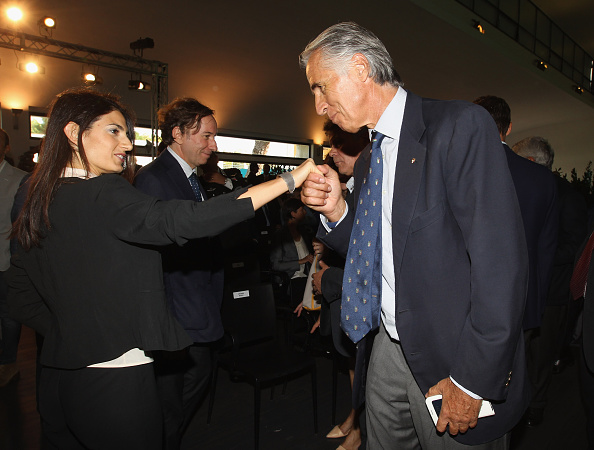Maybe corruption is everywhere within and around the Olympic movement. Or maybe not. Maybe an Olympic Games is a financial boondoggle. Or maybe not.
The International Olympic Committee needs to better understand — and then confront — the perception, widely held around the world and particularly in its longstanding base in Europe, that the movement stands not for inspiration but distress. This is a huge problem. This problem is now playing out in the campaign for the 2024 Summer Games. Real life has revealed Agenda 2020, the IOC’s 2014 would-be reform program, for what it always was, mostly lip service. The institution needs big changes in the way in which it selects cities to stage the Games, in particular its franchise, the Summer Olympics.
The ugly implosion over the past few days of the Rome bid for 2024 underscores the seismic fractures.
Virginia Raggi, a 38-year-old lawyer, is Rome’s first female mayor. She was elected in June. Part of what carried her to office was no to the Olympics. So it can hardly be a surprise that this week she made that position formal.
The dig is that she wouldn’t even meet with sports officials before the news conference at which she described the bid as irresponsible. She kept them waiting for 35 minutes. They left. Then she showed up a half-hour late to that news conference, declaring, "In light of the data we have, these Olympics are not sustainable. They will bring only debt.”
In response, those officials, in a lengthy and bitter statement, couldn’t even bring themselves to utter her name.
The statement goes on at length in explaining why the bid team was “disappointed”:
That “prejudice and superficiality have won.” That “this same political force has transformed an extraordinary opportunity for youth and the city into an ideologically, politically and demagogically based decision, and that rather than taking action they have opted to do nothing.” That this “new political force” did “not want to take advantage of the opportunity to launch a significant project of urban redevelopment, as was the result of the 1960 Games in Rome.”
That “the rhetoric around wastefulness has won out over the new, important IOC regulations, created specifically to address waste and projects that are not beneficial for citizens and to involve other cities in the hosting of the Games.”
Italian Olympic Committee president Giovanni Malago further told reporters that Italy — Rome has now dropped out of two races in four years, for 2020 and 2024 — isn’t likely to bid for perhaps the next 20 years.
He also said during the week, “We’ve lost all credibility if we pull out. Because they’ll think people in Italy are not serious.”
Well, no. At least not about staging the Olympics. The Torino 2006 Winter Games were pretty much a logistical train wreck.
But that’s not the point.
The point is that Italy has long been an IOC member stronghold. And yet the “new, important regulations,” meaning Agenda 2020, couldn’t convince the mayor of Rome that an Olympic bid might be worth it.
And she is far from alone.
The underlying cause of the mayor’s concern amounts to the same thing that, to varying degrees, caused no fewer than five European cities to drop out of the 2022 Winter Games campaign, leaving only Beijing and Almaty, Kazakhstan. A sixth, Lviv, Ukraine, dropped out because of war.
It’s all about money and the perception that an Olympics costs way, way, way too much and amounts to way, way, way too much trouble.
The cost figure commonly associated with the 2014 Games in Sochi is $51 billion.
Rio 2016 ran way over budget. London 2012 ran way over budget. Tokyo in 2020 had to start over from scratch with the stadium because it started costing way too much.
Beijing in 2008 ran to a reported $40 billion.
In China, perhaps $40 billion against the national budget amounts to a rounding error. Maybe that’s why last summer the IOC opted for Beijing for 2022.
If money isn’t a problem in China, there’s this: snow. Like, there isn’t really any in the far-off mountains where the 2022 snow events are due to be held.
A system that produces this sort of process and result is irrational if not worse.
Agenda 2020 was supposed to be the answer, at least according to the IOC. And the 2024 race was due to mark the test of the 40-point reform plan.
In the bid context, Agenda 2020 was supposed to turn the tables. Instead of the IOC setting forth a list of demands, cities were supposed to come to the IOC with competing visions for what a Games could and should be.
The evidence clearly shows that politicians and voters understand that Agenda 2020 is not any sort of fix.
Boston opted out -- which at least paved the way for Los Angeles, what should have been the U.S. choice all along.
Hamburg, Germany? Out in a voter referendum.
Now Rome.
That’s three total, and two of the five formal candidates. Left standing, for now: LA, Paris and Budapest, and only the first two are widely viewed as serious contenders. Budapest may yet face a referendum.
And read again that Rome 2024 exit statement — with a focus, at least in significant part, on the idea of an Olympics as an “opportunity to launch a significant project of urban redevelopment.”
No.
The era of the Games as urban catalyst, launched in Barcelona in 1992, is done.
Again: done, finished, no mas.
The day after rejecting the 2024 Olympic bid, meanwhile, Raggi said Rome would be “honored” to help stage the Euro 2020 soccer tournament at Stadio Olimpico — which, it should be obvious, is on the ground. It was extensively rebuilt for the 1990 World Cup and was the site of that tournament’s final.
It’s curious that the lengthy bid committee's exit statement did not address two essential facts noted in the Associated Press report about the mayor’s decision: the Rome 2024 candidacy had been allotted a budget of $27 million and much of that had already been spent.
The IOC won’t make its 2024 decision until next September 13, and yet a bid has already blown through, say, $25 million?
That just highlights, again, the serious disconnect at issue.
To reiterate the premise launched in this space a few days back: the IOC needs to buy itself time to study the bid process from start to finish, with help from leading experts and the aim of making it workable and, more, appealing. This is, at the core, both a governance and PR problem.
The IOC still won’t let its members visit cities bidding for the Games, a result of the late 1990s Salt Lake City corruption scandal. It’s little wonder officials and voters in so many cities don’t trust the IOC when the IOC won’t even trust its own members.
Plus, there’s the FIFA scandal. The allegations of state-sponsored doping in Russia. And more.
The IOC needs time to address these challenges.
The logical way to buy that time is for the IOC to award the Games to Los Angeles in 2024 and Paris in 2028, and in that order.
Budapest is a lovely, lovely city. But it’s not what the IOC, and the Olympics, need right now.
What the Olympics need is a place where 95 percent or more of everything needed for a Games already exists. (Los Angeles, the bid committee this week announcing the intended use of more venues that are already on the ground.) Where the mayor, governor and federal authorities are on board. (Los Angeles.) Where polls show public support at nearly 90 percent. (Los Angeles, and it would be curious indeed to see the results of an independent survey of residents of the city of Paris — not a France poll and not an online survey.)
Where, moreover, the national Olympic committee and bid team have forged a real partnership. (The U.S. Olympic Committee and LA 2024 announced Friday they have come to agreement on the key issue of what’s called a joint marketing agreement. Fights over this agreement produced bid-threatening friction for the Chicago 2016 and New York 2012 efforts. “We talk repeatedly about a high-quality partnership this is, and this is a demonstration of the quality of the partnership,” USOC board chair Larry Probst said.)
California has 12 percent of the American population but accounts for 20 percent of the public companies on the major American markets, including Google, Facebook and Apple, a column in the New York Times reported this week. It’s zero wonder why the IOC president, Thomas Bach, made a visit earlier this year to Silicon Valley.
Because all these conditions are real, a Los Angeles organizing committee would be free to use the Games not as a catalyst for urban renewal. Appropriately, it could reimagine the Games for the 21st century.
There’s this, too, even if few want to acknowledge it in the public space. The IOC has over the past several cycles dismissed the first- and third-largest cities in the United States. LA is the second-biggest. You want to say no thanks to numbers 1, 2 and 3 and somehow expect the United States would come back for another try in 2028? The chances of that are — slim.
Paris is a lovely city as well, rich with Olympic history, and a 2024 Games there would mark the 100th anniversary of the 2024 Games.
But the IOC is not in the anniversary business.
It’s in the relevancy business. And it needs to go where conditions are ripe to sustain — better, advance — that relevance with young people.
LA for 2024, Paris for 2028. It’s about time.




